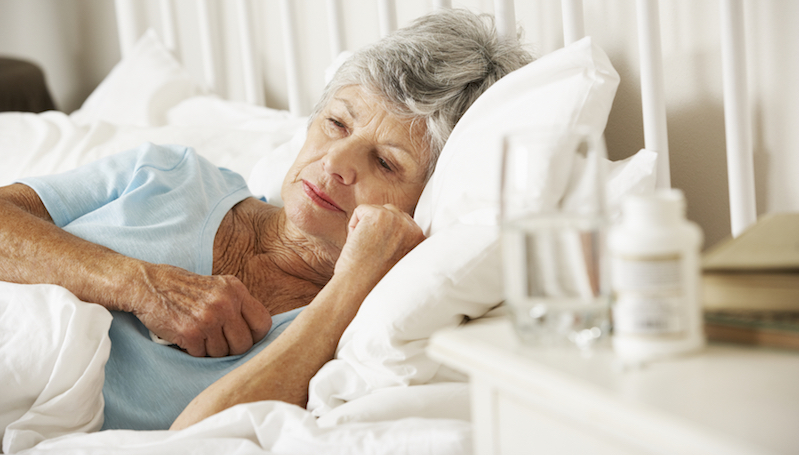While sleep problems may increase with age, they shouldn’t be simply accepted as an unpleasant aspect of aging. Sleep issues can have serious consequences including depression, lack of attention, memory problems, nighttime falls and other issues. They can also lead to heart problems, high blood pressure, stroke, diabetes and weight gain.
A poll by the National Sleep Foundation found that 44 percent of older persons experienced symptoms of insomnia at least a few nights per week. That’s a serious problem because it can lead to the issues mentioned above, but also because sleep lets our bodies rest and restores our energy levels.
Sleep problems may indicate a medical condition
Changes in sleep patterns may be mild but frustrating: falling asleep sooner in the evening, awaking earlier or taking longer to fall asleep. Or, they may be serious: waking up during the night, daytime sleepiness or inability to fall asleep. The disturbances may signal a medical condition.
Sleep problems have many causes, including medications, stress and illnesses, such as arthritis, restless legs syndrome and sleep apnea. With apnea, breathing stops temporarily during sleep. It is often indicated by snoring, the cause of sleep disruption for about 90 million Americans. When untreated, sleep apnea puts people at risk for cardiovascular disease and other disorders.
Tips for a better night’s sleep
At Country Meadows Retirement Communities, we know that sound sleep contributes to good health. If a resident in senior independent living or personal care/assisted living has nagging sleep problems, we encourage him or her to talk with a physician. In the meantime, some seniors find relief by following one or more of these suggestions:
- Maintain a regular bedtime – Go to sleep and wake up at the same times every day.
- Take a warm bath – It may help you feel tired, slow down and relax.
- Unplug before bedtime – Turn off TV and electronic devices at least an hour before bedtime.
- Don’t drink alcohol or caffeine near bedtime – Even small amounts can disrupt nighttime sleep.
- Drink less liquid in the evening – Trips to the bathroom will interrupt your sleep.
- Wear yourself out – Exercise regularly but not within three hours of bedtime.
In addition, keep your bedroom quiet, dark and cool; don’t eat meals right before bedtime (but a light snack may help); get daytime aerobic exercise and try pre-bedtime relaxation techniques (read a book, listen to quiet music, release stress by listing your worries on paper).
Also note the National Sleep Foundation’s caution that older persons can respond differently to medications than younger ones. So, rather than take an over-the-counter medicine on your own, talk with your doctor, who may want to prescribe an alternative. Your physician might also recommend an effective behavioral therapy.
At Country Meadows, we care about and attend to every aspect of our residents’ health. If you would like support for your health and plan on choosing a retirement community near you, we invite you to contact us. We would be glad to give you a tour any of our senior communities and introduce you to our full range of services. We have 10 Pennsylvania retirement homes in Lancaster, Hershey, Mechanicsburg, Pittsburgh, Wyomissing, York-South, York-West, Allentown, Bethlehem and our newest community, Easton—as well as a Maryland retirement home in Frederick.



